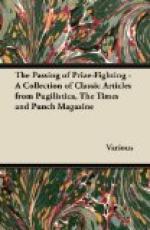Details of the tour which have already reached home indicate that its success is profound.
At Boston Mr. SHORTER, although his visit was brief, found time to deliver his famous causerie, “Men of Letters Whom I have Influenced,” with special reference to GEORGE MEREDITH.
At Waterbury (which there is some possibility of renaming Shorterbury) the great critic was made the recipient of an address of welcome and a watch.
At Pittsburg the freedom of the Carnegie Libraries all over the world was conferred upon him by the famous iron-master.
At Haworth (Minn.) Mr. SHORTER presented the postmaster with an autographed copy of his magnum opus on the BRONTES.
At Salt Lake City he enchanted the Mormon Elders by anecdotes of THACKERAY’S relations with their namesake, the London publisher.
At Peoria (Ill.) he kept his audience in roars by recounting the good sayings of his critical confrere, Sir WILLIAM ROBERTSON NICOLL.
At Philadelphia a very old man, who claimed to be a younger brother of Mr. Rochester (in Jane Eyre), publicly embraced the illustrious visitor and borrowed two dollars.
The rumour that Mr. SHORTER is to be appointed as our Ambassador in Washington must not be too lightly dismissed. America often sends us a man of letters—LOWELL, for example, and HAY. Why should we not return the compliment? It would be a better appointment than many that could be named.
The fact cannot be concealed that at home the absence of Mr. SHORTER in America is seriously felt. Fleet Street wears a bereaved air and Dublin is conscious of a poignant loss. As for our authors, they are in a state of dismay; some, it is true, like mice when the cat is away, are taking liberties, but most are paralysed by the knowledge that the watchful eye is not there, the hand, so instant to blame or praise, is resting. Even publishers, normally an insensitive race are shaken, and books that were to have been issued have been held back. For what is the use of bringing out new books if C.K.S. is not here to pass definitive comments upon them before their ink is dry?
England’s loss is, however, America’s gain. A new cocktail has been named after him.
* * * * *
[Illustration: WITHIN THE LAW?]
* * * * *
THE PEACE TREATY.
What really impressed the Germans most of all with the power of the Big Four was the third clause of Section 3, as given in the Press:—
“LEFT BANK OF THE RHINE.
... Germany must not
maintain or construct any fortifications
less than fifty kilometres
to the East of the Rhine.”
Even WILHELM himself never succeeded in reversing the course of this famous river.
* * * * *
“The fifth issue of
The Indian Year Book is issued a little
later than the earlier editions.
For this the Editor would ask
immunity.”—Preface
to “The Indian Year Book.”




